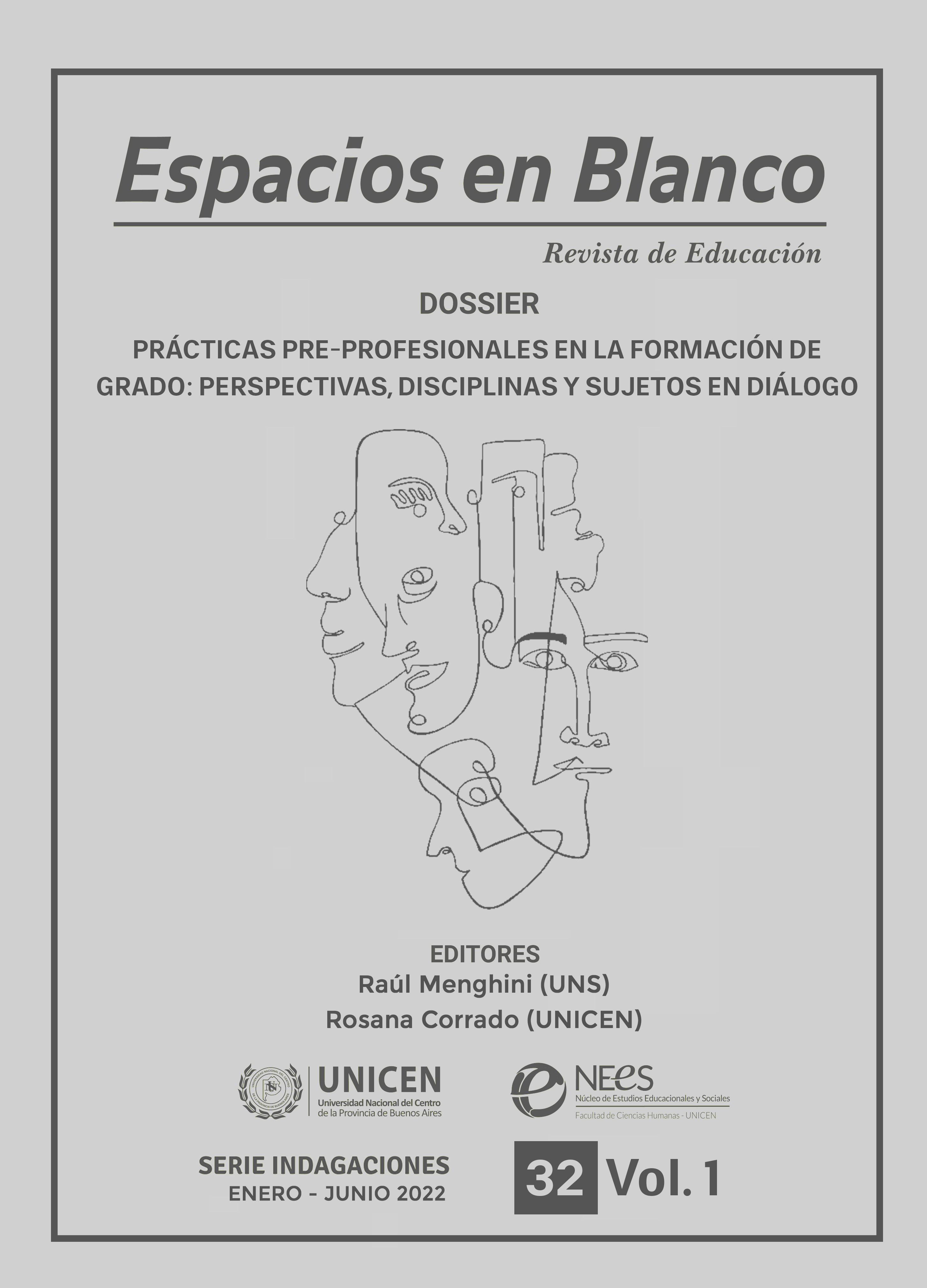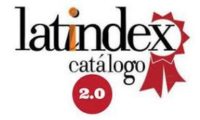Abriendo Senderos: Solidaridad y Educación con Trabajadores Agrícolas Migrantes en California
DOI:
https://doi.org/10.37177/UNICEN/EB32-317Palabras clave:
Educación Multicultural, Educación Comunitaria, Educación Migrante, Sociología de la EducaciónResumen
Este estudio examina el proceso de participación y activismo emergente en una comunidad de trabajadores agrícolas de origen Mexicano en el sur de California, que se organizan para mejorar la educación que reciben sus hijos. Basado en las narrativas de los participantes exploramos las disposiciones que motivan y contextualizan el proceso de participación padres y madres migrantes, promoviendo mayor colaboración entre ellos y el personal escolar. Colaboraciones equitativas y participativas entre familias migrantes y las escuelas a las que asisten sus hijos pueden ser altamente beneficiosas para el desarrollo escolar de estos estudiantes, cuyos indicadores socio-económicos y académicos han estado rezagados históricamente. El estudio examina estas
preguntas: ¿Cuáles son las disposiciones, eventos y contextos que favorecen la participación y el activismo de familias agrícolas migrantes en la escolaridad de sus hijos? ¿Cuáles son las motivaciones y desafíos que contextualizan su proceso de conciencia, solidaridad y compromiso con su educación?
Citas
Bertaux, D. y Kohli, M. (1984). The life story approach: A continental view. Annual Review of Sociology, 10, 215-237.
Beverley, J. (2005). Testimonio, subalternity and narrative authority. In N. Denzin y Y. Lincoln (Eds.), The SAGE handbook of qualitative research (pp. 530-547). Thousand Oaks, CA: SAGE.
Branz-Spall, A., Rosenthal, R., y Wright, A. (2003). Children of the Road: Migrant Students, Our Nation's Most Mobile Population. The Journal of Negro Education 72 (1), 55-62.
Bhugra, D. y Becker, M. A. (2005). Migration, cultural bereavement and cultural identity. World Psychiatry, 4 (1),18-24.
Cattone, K., Chung, C., y Oh, S. (2011). An Appetite for Change: Building Relational Cultures for Educational Reform and Civic Engagement in Los Angeles. In M. Warren, y K. Mapp. A match on dry grass: Community organizing as a catalyst for school reform. New York, NY: Oxford University Press.
Chao, G. and Moon, H. (2005). The Cultiral Mosaic: A Metatheory for Understanding the Complexity of Culture. Journal of Applied Psychology, 90 (6), 1128-1140.
Chavez, L. (1982). Shadowed lives: Undocumented immigrants in American society. San Diego, CA: Harcourt Brace.
Cooper, C. W. (2009). Parent involvement, African American mothers, and the politics of educational care. Equity & Excellence in Education, 42, 379-394.
Delgado Gaitán, C. (1994). Sociocultural change through literacy: Toward the empowerment of families. In Bernardo Ferdman, Rose-Marie Weber and Arnulfo Ramirez (Eds.), Literacy across Languages and Cultures (pp. 143-171). Albany: University of New York Press.
Employment Development Department (2019). Agricultural Employment in California. Retrieved from https://ww w.labormarketinfo.edd.ca.gov/data/ca-agriculture.html
Fennimore, B. (2017). Permission Not Required: The Power of Parents to Disrupt Educational Hypocrisy. Review of Research in Education: Disrupting Inequality rough Education Research, American Educational Research Association, pp. 159-181.
Flores, S. y Chapa, J. (2009). Latino Immigrant Access to Higher Education in a Bipolar Context of Reception. Journal of Hispanic Higher Education, 8 (1), 90-109.
Fraga, L. y Frost, A. (2011). Democratic institutions, public engagement, and Latinos in American public schools. In M. Orr. y J. Rogers (Eds.) Public Engagement for Public Education (pp. 117-138) Stanford, CA: Stanford University Press.
Freire, P., Araujo Freire, A. y De Oliveira, W. (2014). Pedagogy of Solidarity. Walnut Creek, CA: Left Coast Press.
Funkhouser, J. y Gonzalez, M. (1997). Family Involvement in Children's Education: Successful Local Approaches. Office of Educational Research and Improvement U.S. Department of Education. Recuperado de http://ed.gov/PDF Docs/97-7022.pdf. Retrieved May 12, 2012.
Gans, H. (1962). Participant observation in the era of ethnography. Journal of Contemporary Ethnography, 28 (5), 540-548.
Gindling, T. y Poggio, S (2009). Family Separation and the Educational Success of Immigrant Children. Policy Brief.
UMBC Policy Brief #7. University of Maryland. Baltimore, MD.
Jasis, P. y Marriott, D. (2010). Todo por nuestros hijos/All for our children: Migrant families and parent participation at an alternative education program. Journal of Latinos in Education, 9 (2), 126-140.
Jasis, P. y Ordoñez-Jasis, R. (2005). Convivencia to empowerment: Latino parent organizing at La Familia. High School Journal, 88 (2), 33-43.
Kanter, J., Santiago-Rivera, A., Rusch, L., Busch, A. y West, P. (2010). Initial outcomes of a culturally adapted behavioral activation for Latinas diagnosed with depression at a community clinic. Behavior Modification, 34 (2), 120-144.
Kindler, A. L. (2002). Education of Migrant Students. Recuperado de http://education.stateuniversity.com/ pages/2231/Migrants-Education.html
Kohlers, A. (2017). Solidarity as Environmental Justice in Brownfields Remediation. Critical Review of International Social and Political Philosophy, 21, 554-569. DOI: 10.1080/13698230.2017.1398857.
LaCroix, C. (2007). Girls and Boys, Interrupted: Working to Fill Gaps in Migrant Students' Education. Recuperado de http://www.edutopia.org/girls-boys-interrupted
Lam, S. F. (1997). How the family influences academic achievement. New York, NY: Garland Publishing.
Laureau, A. (1994). Parent involvement in schooling: A dissenting view. In C. Fagnano y B. Werber (Eds.) School, family and community interactions (pp. 180-183). Boulder, CO: Westview Press.
Lundy-Ponce, G. (2010). Migrant Students: What We Need to Know to Help Them Succeed. Colorín Colorado Series. Recuperado de https://www.colorincolorado.org/article/migrantstudents-what we-need-know-help- them-succeed.
Martin, P. (2016). The rights of migrant workers: Economics, politics and ethics. International Labour Review. Recuperado de https://doi.org/10.1111/ilr.12025
Martinez, Y. G. y Cranston-Gingras, A. (1996). Migrant farmworker students and the educational process: Barriers to high school completion. The High School Journal, 80, 28-38.
Mc. Laughlin, H., Liljestrom, A., Hoo Lim, J. y Meyers, D (2002). LEARN: Latino Immigrants and Education. Education and Urban Society, 34, 212-232.
Menchaca, M. (2008) The Treaty of Guadalupe Hidalgo and the Racialization of the Mexican Population. In J. Moreno (ed.) The Elusive Quest for Equality: 150 Years of Chicano/Chicana Education (pp. 3-31). Harvard Educational Review. Cambridge, MA.
Migrant Education Program - MEP (2017). Program Profile. English Learner Support Division, California Department of Education.
Migrant Education Program - MEP (2018). Program Profile. English Learner Support Division, California Department of Education.
Moll, L. y Ruiz, R. (2009). e Schooling of Latino Children. In M. Suárez-Orozco y M. Páez (Eds.) Latinos Remaking America (pp. 362-389). University of California Press. Berkeley, CA.
NAWS-National Agricultural Worker Survey (2005). U.S. Department of Labor. Recuperado de http://www.dolet a.gov/agworker/naws.cfm
National Clearinghouse for Bilingual Education (2001). Migrant Families, School Programs for Migrant Students. The Classroom, National and State Programs. Recuperado de https://education.stateuniversity.com/pages/223 1/Migrants-Education.html
Nuñez, A. (2009). Migrant Students' College Access: Emerging Evidence from the Migrant Student Leadership Institute. Journal of Latinos and Education, 181-198. Recuperado de https://doi.org/10.1080/153484309028 88781
Orr, M. y Rogers, J. (2011). Public Engagement for Public Education: Joining Forces to Revitalize Democracy and Equalize Schools. Stanford, CA: Stanford University Press.
Osterling, P. (2001) Waking the Sleeping Giant: Capitalizing on the Socio-Cultural Strengths of the Latino Community. Bilingual Research Journal, 25 (1-2), 1-30.
Perkins, D. D. y Zimmerman, M. A. (1995). Empowerment theory, research, and application. American Journal of Community Psychology, 23, 569–579.
Robbins, S. P., Chatterjee, P. y Canda, E. R. (1998). Contemporary human behavior theory: A critical perspective for social work. Boston: Allyn and Bacon.
Rodriguez, M., Toller, J. y Dowling, P. (2003). Health of Migrant Farm Workers in California. Sacramento, CA: California Research Bureau.
Romanowsky, M. H. (2010). Meeting the unique needs of the children of migrant farmworkers. Wilson Web Clearing House, 77, 27-33.
Salinas, J. (2007). Educational experiences of children in the migrant stream: Ecological factors necessary for academic success. Unpublished Dissertation. Bowling Green State University.
San Miguel, G. y Donato, R. (2010). Latino Education in the Twentieh-Century America: A Brief History. In E. Murillo, S. Villenas, R. Galván, J. Sánchez Muñoz, C. Martínez, and M. Machado Casas (Eds.) Handbook of Latinos and Education: eory, Research, and Practice (pp. 27-63). Routledge, NY and London.
Taylor, Z. y Ruiz, Y. (2017). Contextual Stressors and the Mental Health Outcomes of Latino Children in Rural Migrant-Farmworker Families in the Midwest. Journal of Rural Mental Health 41(4), 284–298.
Tischner, J. (1981). Etyka solidarności [Ethics of Solidarity]. Kraków: Znak.
Valdés, G. (1996) Con Respeto: Bridging the distance between Culturally Diverse Families and Schools: An Ethnographic Portrait. New York. Teachers College Press.
Velazquez, L. (1996) Voices from the Fields: Community-Based Migrant Education. New Directions for Adult and Continuing Education (70), 27-35.
Warren, M. (2001). Community organizing for education reform. In Public Engagement for Public education. Stanford, CA. Stanford University Press.
Warren, M. and Mapp, K. (2011). A match on dry grass: Community organizing as a catalyst for school reform. New York, NY: Oxford University Press.
Weiss, C. (1998). Evaluation: Methods for studying programs and policies. Upper Saddle River, NJ: Prentice Hall.
Worg, D. (2011). Public engagement education and the coproduction of public education. In M. Orr, y J. Rogers (Eds.) Public Engagement for Public Education. Stanford, CA: Stanford University Press.
Zalaquett, C., Alvarez McHatton, P. y Cranston-Gingras, A. (2007). Characteristics of Latina/o migrant farmworker students attending a large metropolitan university. Journal of Hispanic Higher Education 6 (2), 135-156.



















